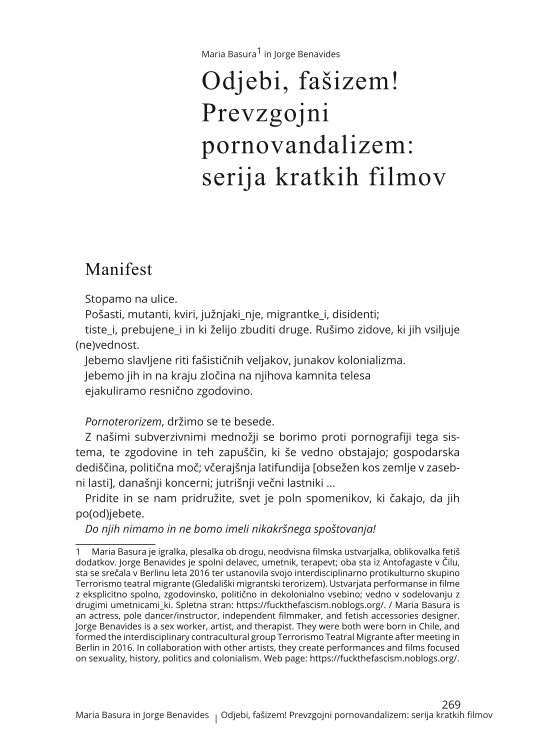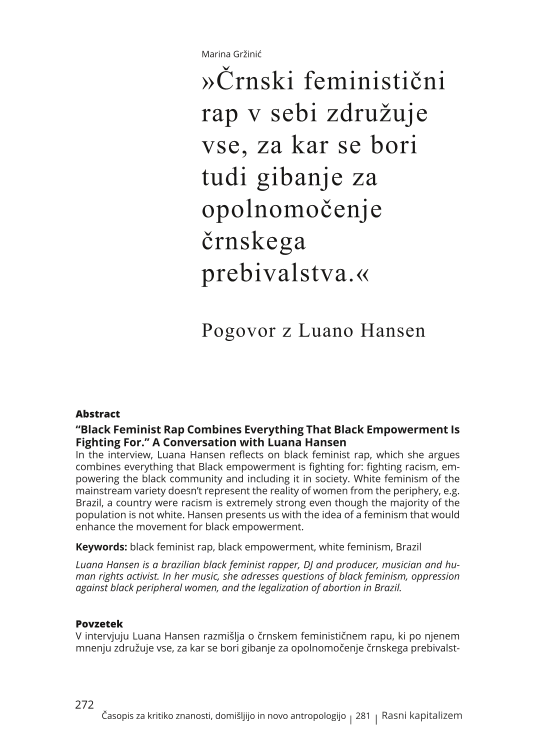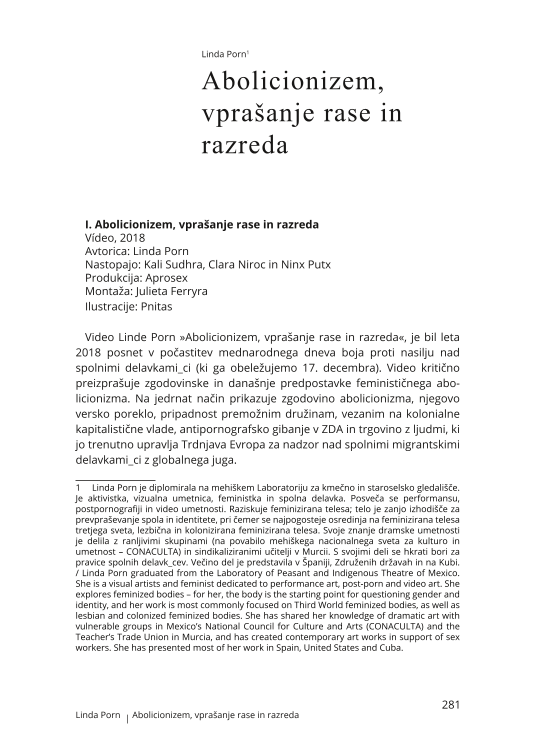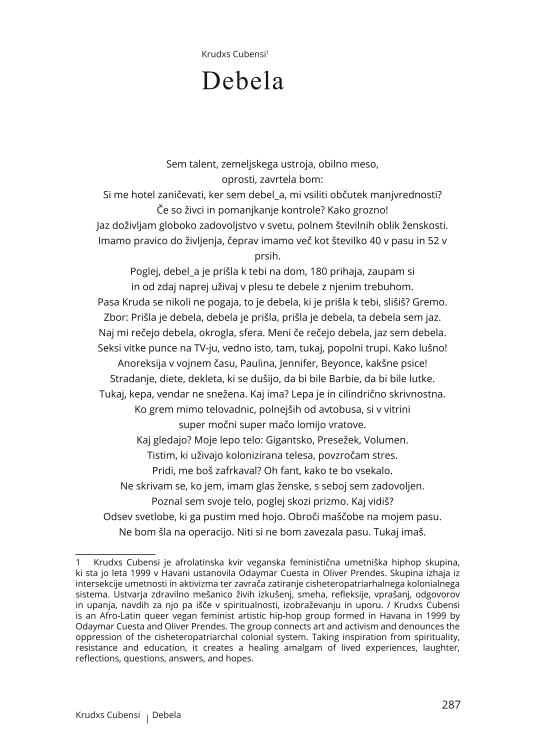Čeprav je socializem/komunizem zgodovinsko pomenil revolucionarni poskus preloma s kapitalistično kolonialno politično in ekonomsko organizacijo družbe, so se razredna delitev, patriarhat, bizarnost spola, heteronormativnost ohranjali in organizirali tudi v bratstvu in enotnosti. Zato se ta številka hkrati osredotoča na vprašanja o odnosih med socializmom, feminizmom, dekolonialnimi boji, med postsocializmom devetdesetih in postkolonializmom po drugi svetovni vojni ter stanju novega hitrega kapitalizma in dekolonialnosti.
The author analyzes the modern prison complex, which is a central but by no means the only defining institution of carceral geographies in the United States and beyond. In connection with the prison complex, the author identifies regional strategies of accumulation and upheavals, as well as the immensities and fragmentations that are reconstituted in space-time to begin another round of accumulation. The analysis also demonstrates how the prison evolved in tandem with world-historical transformations of the role of money in everyday life.
“It Might Well Be That the Future of Our Planet Will Play Out in Africa.” A Conversation with Achille Mbembe
(
In the interview, Achille Mbembe reflects on the issues of colonialism and post-colonialism, post-socialism, and the future of humanity in the age of new technologies. The concept of “Necropolitics” from his seminal essay published in 2003 is also discussed. In that essay, Mbembe argued that Foucault’s notion of biopolitics falls short in explaining the contemporary forms of subjugation of life, and instead proposed the notion of politics based on death which, in turn, structures both the notions of sovereignty and the political. Mbembe has often argued that the academic and popular discourses on Africa are full of clichés, Western fantasies and fears. However, Africa as we know it today did not even exist before the 19th century.
The text is a transcript of a lecture that the author gave in Brussels in 2018 at an event organized as part of the Genealogy of Amnesia project. Womba Konga reflects on the issues of amnesia in Belgium, and emphasizes the importance of decolonization of Patrice Lumumba, a Congolese politician and independence leader. When analyzing colonial history, we have to emphasize that the colonization of the Congo is not just a Congolese issue, but is actually primarily a Belgian issue. In such a context, remembering 17th January as the day of Lumumba’s death becomes even more important.
The article takes a decolonial point of view and attempts to advance a construction of the genealogy of the relationship between feminist politics and black and indigenous antiracist struggles in Abya Yala. The author explores the late emergence of antiracist, decolonial, and ethno-racial movements and struggles in Latin America, the understanding of mestizaje (racial mixing) ideology and Westernization as obstacles to overcome, and the attempts, even from the feminist side, of decolonizing the racist imperial mind.
The article is based on a study the author conducted betwen 2015–2018 in Greece. The author observed the emergence and growth of a new economy that was established around refugee settlements and included food, health and transportation suppliers, security guards, aid workers, cleaners, and cross-examiners. Recognizing the similarities with the situation in Kosovo between 1999 and 2004, the author analyzes multiple “innovative entrepreneurship initiatives” that emerged and tried to get funding from the EU for anything that could be interpreted as “humanitarian architecture”.
The ethnographic study analyzes the Balkan Corridor (established in 2015) through an understanding of those who experienced it. The article raises the question of how to understand the migrant movement so that those who cross different countries can be treated equally and as belonging to their own political community. The article analyzes the testimonies and struggles of migrants who crossed the corridor and concluded their journey in Slovenia. Their narratives reveal how a system that prioritizes controlling life over human dignity has deprived migrants of the opportunity to act politically.
This article uses a decolonial approach to locate the emergence of anti-gypsy racism within the context of genocide/epistemicide-based construction of modernity modernity. The author presents the history and present life of Gypsy Roma, and highlights that the Roma community has been racialized ever since the emergence of the Spanish empire.
Afrofeminisms: Emancipatory Possibilities of Remembrance. A Conversation with Esther (Mayoko) Ortega
(
Esther (Mayoko) Ortega reflects on the fact that the Spanish school curriculum doesn’t discuss the matter of the Kingdom of Spain having colonies in Africa. The population lacks knowledge about a crucial part of a history, and doesn’t understand the personal histories of black people that live in Spain. Consequently, descendants of Africans are not recognized as belonging in Spain in the collective Spanish imaginary and everyday practices.
Necropolitics (published in 2019) by Achille Mbembe takes us back into to his seminal text on necropolitics which was translated and published in 2003 in the USA. At that point, 40 years after Foucault’s biopolitics, Mbembe re-theorized biopolitics through the horizon of death. This brought a robust conceptual shift from Occidental thought and left a significant impact on the theory and practice of philosophy, politics, anthropology and aesthetics – necropolitics became one of the centers of analysis. In the essay, the authors analyze the monograph that was written 16 years later on the basis of this shorter text.
Decolonial Pathways of Knowledge and Memory Building. A Conversation with Diego Falconí Trávez
(
In the interview, Diego Falconí Trávez reflects about the processes of memory erasure. He highlights Enrique Dussel’s concept of the first modernity, which signifies the period and time in which imperial Spain began articulating euro-centric and universal notions of History. After eight centuries of Mozarabic power in the Southern part of the Iberian Peninsula, the last years of the 15th century were marked by Castile’s claims over the territory. This is also the period of the conquest of Abya Yala, which was later named as the Americas by the Europeans.
In the article, the author analyses Parasite, a film directed by Joon-ho Bong. The film was nominated for and won a number of awards, among them the Palme d'Or at the Cannes film festival and four Oscars (Best Picture, Best Director, Best Original Screenplay, and Best International Feature Film). The analysis shows that western reception of the film is based on false assumptions about South Korean society, where the collapse of the middle class is becoming more and more evident and neoliberalism is starting to prevail. The analysis is based on a critical assesment of the representation of individual characters and shows that the film is imbued with misogyny and male-centered power, and how gender and capitalistic hierarchy manipulate emotions and control behavior.
The aim of the article is to provide an analysis of the recent phenomenon of trans-phobia on the spectrum of left-wing politics. Transphobic attitudes are not just a reflection of an individual’s oppressive practices, but arise from certain theoretical concepts present within Marxist theory. The authors begin by summarizing the gender-based conflicts that arise within capitalism and lead to gender oppression. In the second part of the article, the authors explain how the left, which draws from Marxist tradition, has failed to recognize these conflicts.
Vampiric Necropolitics: A Map of Black Studies Critique from Marx’s Vampire to Get Out’s Politics of the Undead
(
In this article, the authors advance the concept of “vampiric necropolitics” to identify an important change in black studies and its approach to the problem of appropriating black labor and black bodies. Vampiric necropolitics distinguishes a major change in black critique: while a black radical tradition was previously preoccupied with the extraction of labor from workers, contemporary black studies increasingly examines how black modes of being and feeling are conditioned and controlled by whiteness.
Besedilo je razširjena recenzija zbornika Opposing Colonialism, Antisemitism, and Turbo-Nationalism: Rethinking the Past for New Conviviality (Nasprotovanje kolonializmu, antisemitizmu in turbonacionalizmu: Premišljevanje preteklosti za novo sobivanje), ki so jo uredile M. Gržinić, J. Pristovšek in S. Uitz. Antologija obsega 578 strani in je izšla za Cambridge Scholars Publishing (UK), leta 2020. Antologija je rezultat umetniškega in teoretičnega raziskovalnega projekta Genealogy of Amnesia: Rethinking the Past for new Future of Conviviality (Genealogija amnezije: Premišljevanje preteklosti za novo prihodnost sobivanja), ki ga je za obdobje od 2018 do 2020 finančno podprl Avstrijski znanstveni sklad (FWF). Po besedah urednic Marine Gržinić, Jovite Pristovšek in Sophie Uitz se knjiga »osredotoča na kolektivno amnezijo v zvezi s travmatičnimi dogodki evropske preteklosti in na načine, s katerimi ti pretekli dogodki vplivajo na sedanjost in prihodnost« (str. xi). Z drugimi besedami, knjiga skozi trideset poglavij skuša pojasniti, kako so znotraj Evrope genocidi in politike molka oblikovali konstitucijo identitet, skupnosti in narodov.
The article is a transcript of a lecture the authors held at the European Media Art Festival (EMAF) in Osnabrück, Germany in 2019. The lecture was part of the festival’s accompanying conference “WILD GRAMMAR”, which weas dedicated to the trans-formative power of language. Gržinić and Kancler selected a series of short and experimental videos that thematize trans*/gender discourse, and reflected on how they open up possibilities for new gender politics and reformulate the cinematic language. By addressing the trans* discourses and stories of subversive films from Southern and Eastern Europe, the lecture explores the possibilities of creating new wild meanings.
[z / 1]
me, kreopolitanske : naše
pre/vešanje & relacije,
naše telesne zaznave
,, kar šepeta, da bi šlo do mesa,
čutni okusi, sol, vreme, trs
/ prepredeno z vlažnostjo /
ne/umeščeni, biti ni,
kjer vse možne prihodnosti
razdrejo logiko ozemlje/vanj
Manifest
Stopamo na ulice.
Pošasti, mutanti, kviri, južnjaki_nje, migrantke_i, disidenti;
tiste_i, prebujene_i in ki želijo zbuditi druge. Rušimo zidove, ki jih vsiljuje (ne)vednost.
Jebemo slavljene riti fašističnih veljakov, junakov kolonializma.
Jebemo jih in na kraju zločina na njihova kamnita telesa
ejakuliramo resnično zgodovino.
“Black Feminist Rap Combines Everything That Black Empowerment Is Fighting For.” A Conversation with Luana Hansen
(
In the interview, Luana Hansen reflects on black feminist rap, which she argues combines everything that Black empowerment is fighting for: fighting racism, empowering the black community and including it in society. White feminism of the mainstream variety doesn’t represent the reality of women from the periphery, e.g. Brazil, a country were racism is extremely strong even though the majority of the population is not white. Hansen presents us with the idea of a feminism that would enhance the movement for black empowerment.
Abolicionizem, vprašanje rase in razreda
I. Abolicionizem, vprašanje rase in razreda
Vídeo, 2018
Avtorica: Linda Porn
Nastopajo: Kali Sudhra, Clara Niroc in Ninx Putx
Produkcija: Aprosex
Montaža: Julieta Ferryra
Ilustracije: Pnitas
Video Linde Porn »Abolicionizem, vprašanje rase in razreda«, je bil leta 2018 posnet v počastitev mednarodnega dneva boja proti nasilju nad spolnimi delavkami_ci (ki ga obeležujemo 17. decembra). Video kritično preizprašuje zgodovinske in današnje predpostavke feminističnega abolicionizma. Na jedrnat način prikazuje zgodovino abolicionizma, njegovo versko poreklo, pripadnost premožnim družinam, vezanim na kolonialne kapitalistične vlade, antipornografsko gibanje v ZDA in trgovino z ljudmi, ki jo trenutno upravlja Trdnjava Evropa za nadzor nad spolnimi migrantskimi delavkami_ci z globalnega juga.
Debela
Sem talent, zemeljskega ustroja, obilno meso,
oprosti, zavrtela bom:
Si me hotel zaničevati, ker sem debel_a, mi vsiliti občutek manjvrednosti?
Če so živci in pomanjkanje kontrole? Kako grozno!
Jaz doživljam globoko zadovoljstvo v svetu, polnem številnih oblik ženskosti.
Imamo pravico do življenja, čeprav imamo več kot številko 40 v pasu in 52 v
prsih.




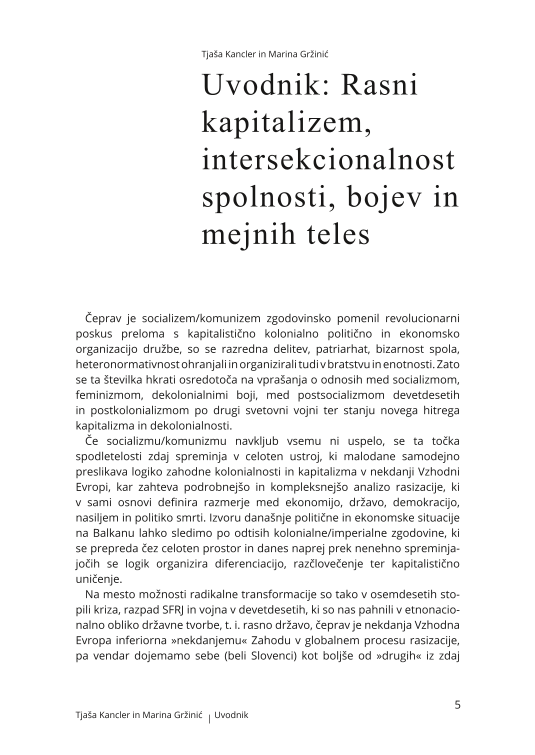
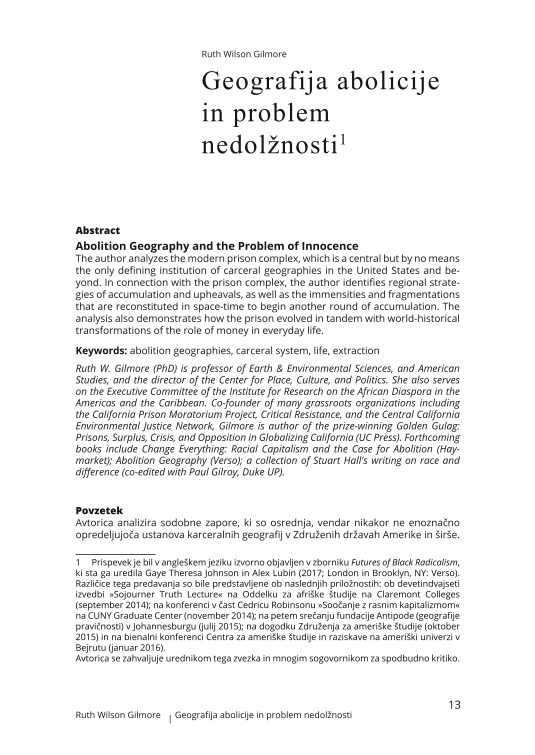
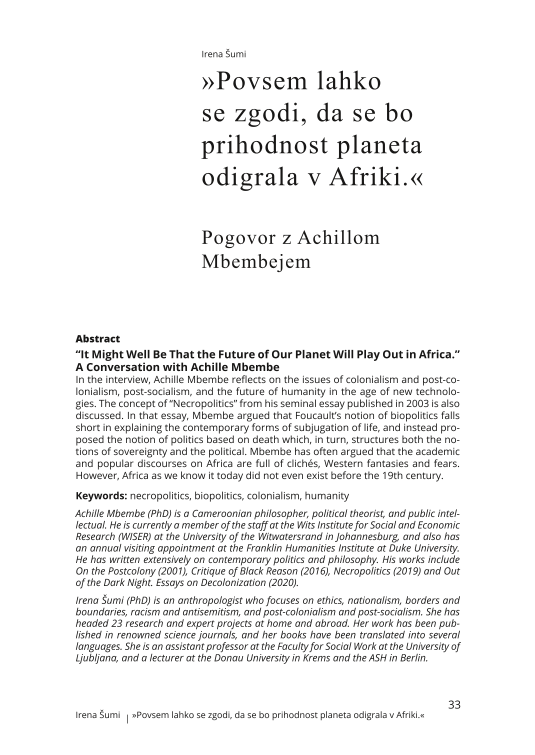
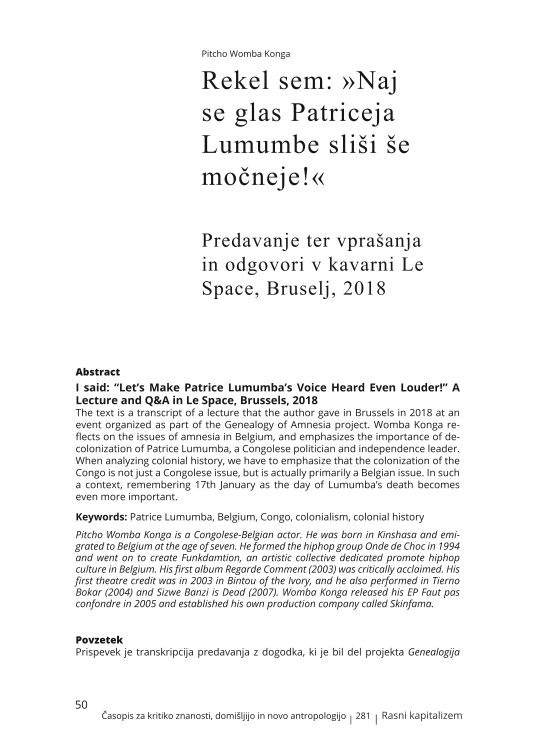
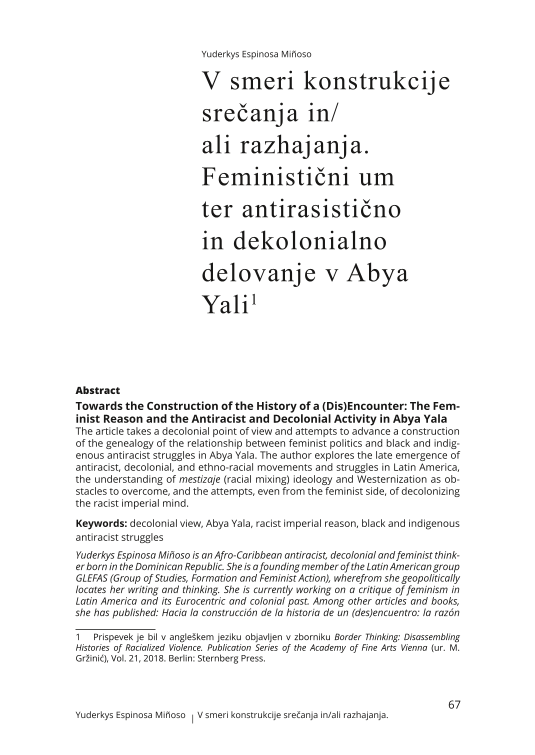
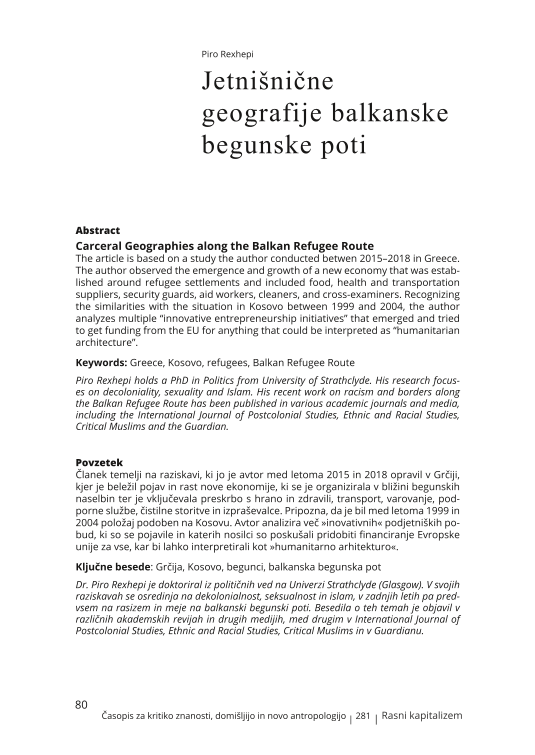
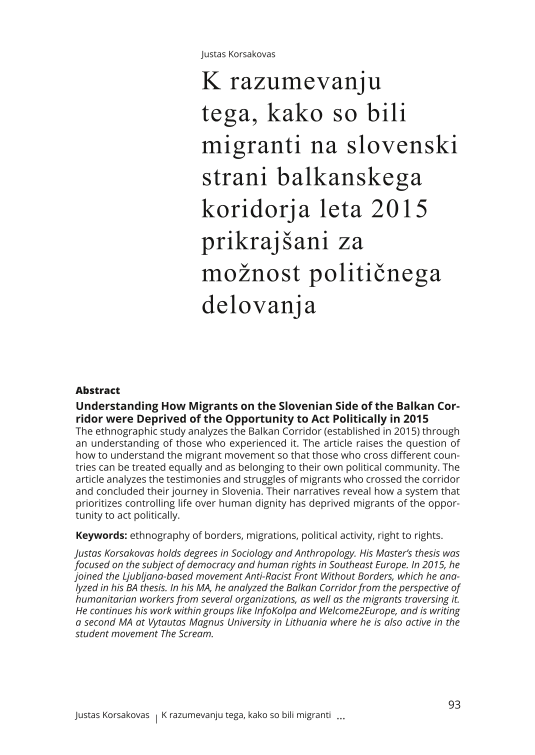
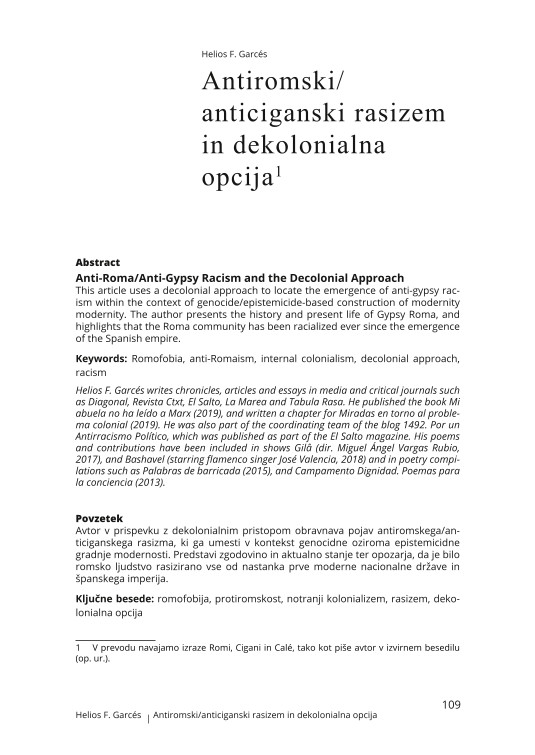
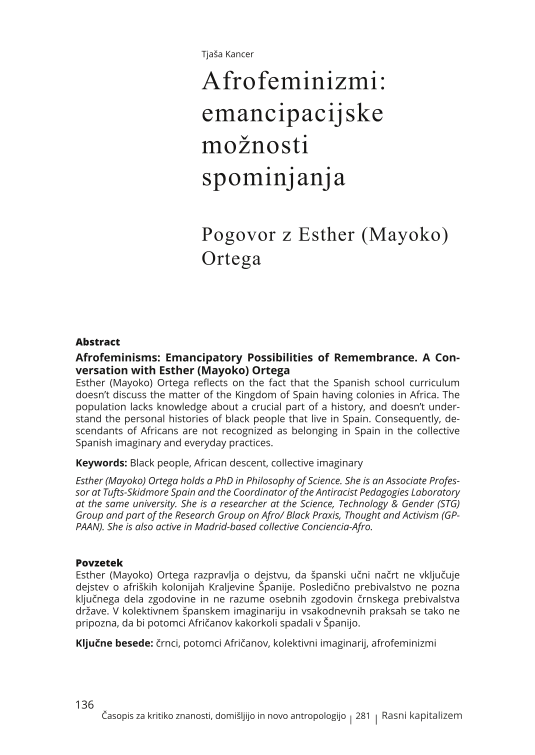
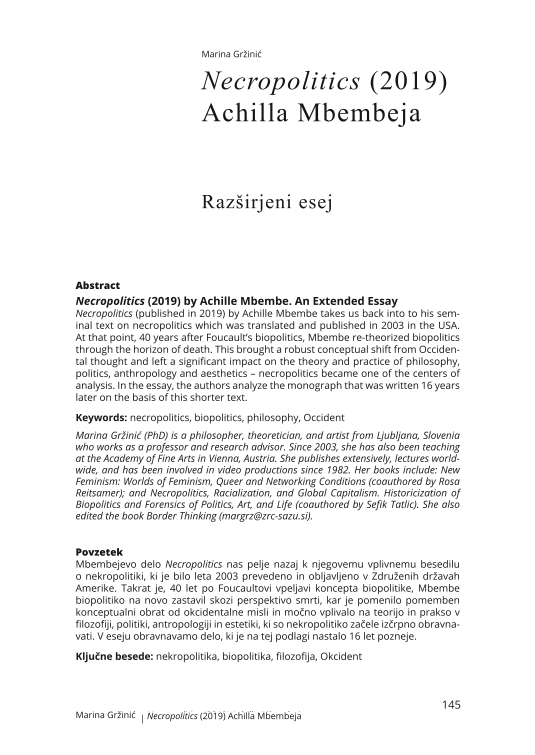
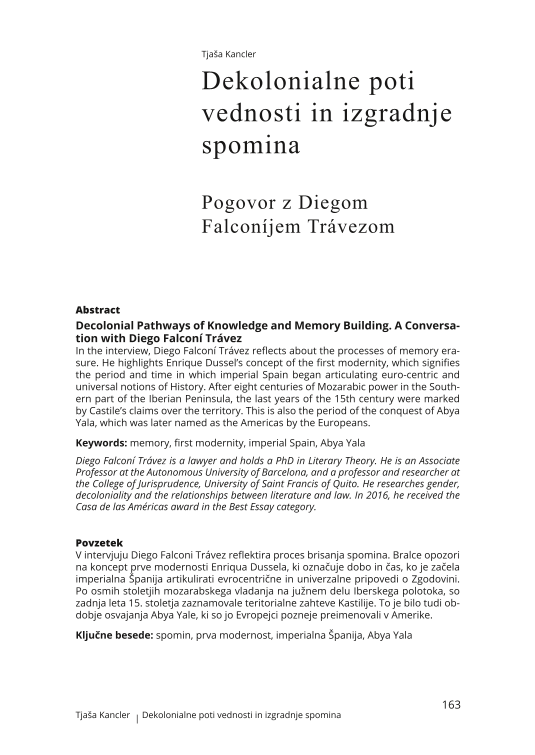
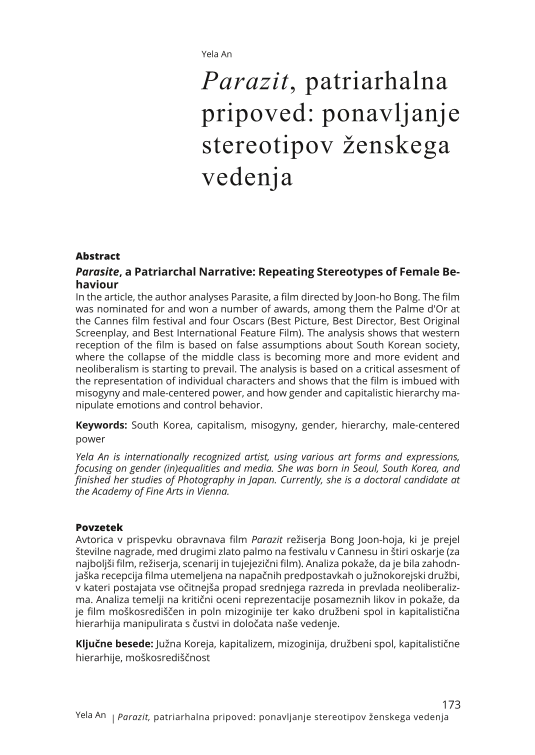
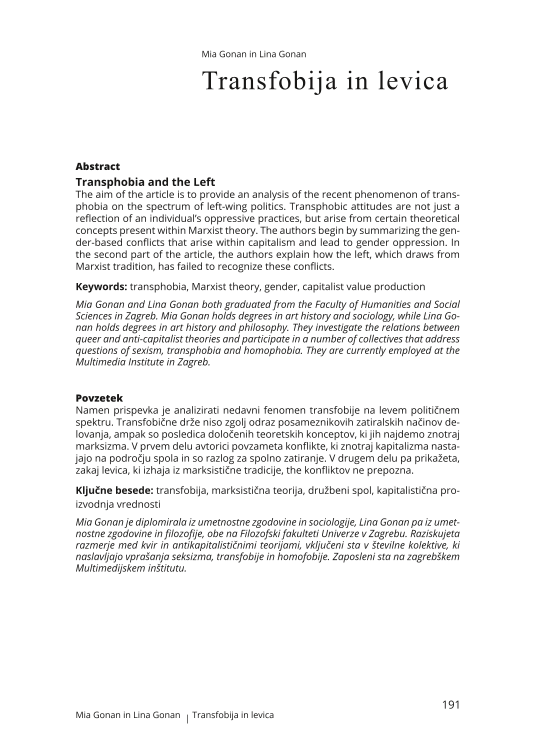
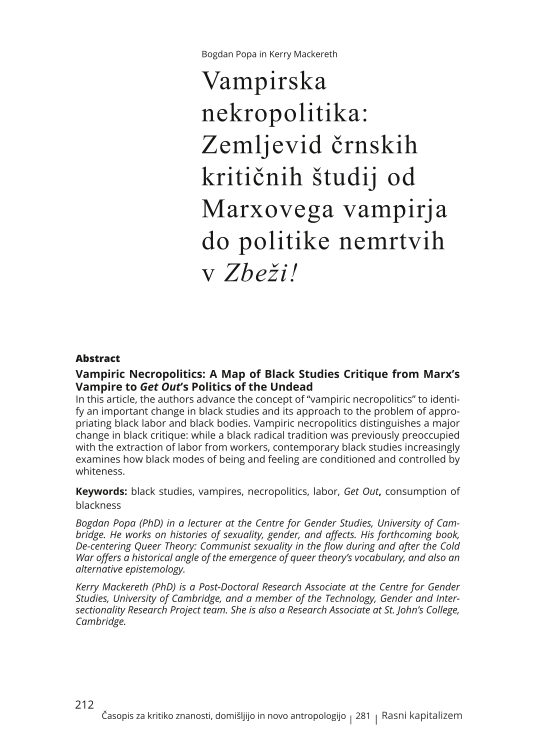
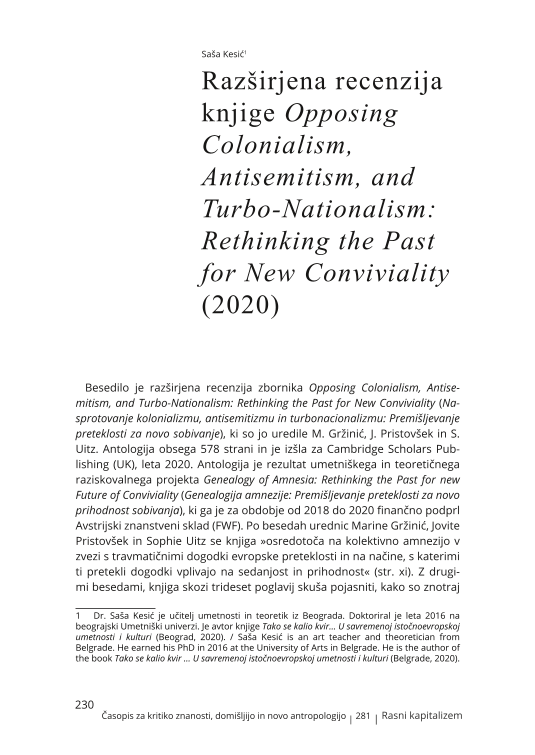
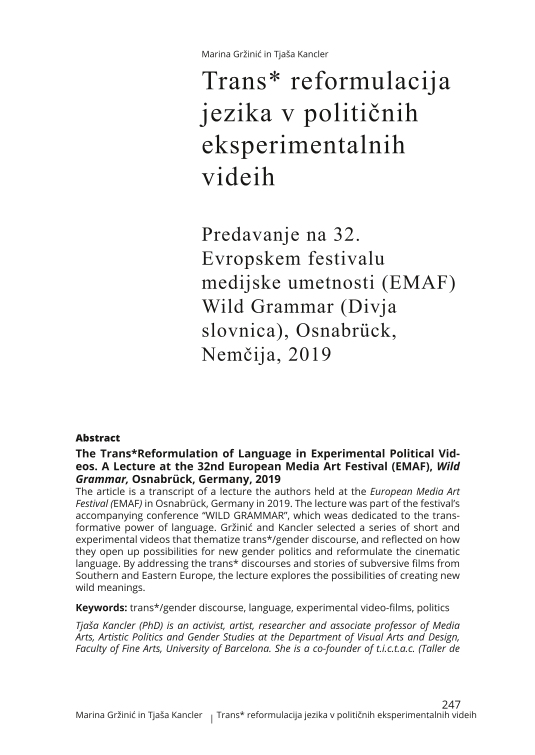
![Apparitions / [9x9]; From £/€xtinctions](/images/publications/journals/281/281-264-268.png)
